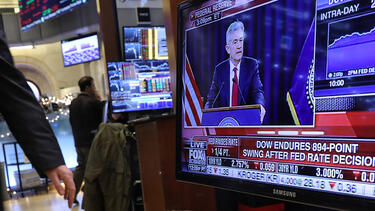Three Questions: Prof. William B. English on Markets and the Fed
The whispers of the chair of the Federal Reserve seem to echo on Wall Street. Whether markets swing up or down, commentators often point to a statement from Jerome Powell as the motivator. We asked William B. English, a Yale faculty member and former Fed official, about how the Fed should respond to recent ups and downs in the stock market.

Photo by Spencer Platt/Getty Images
The market has fallen sharply since the Fed signaled higher rates in the fall. Now Chairman Powell is suggesting a more cautious approach to raising rates—why? Because of the market or the political response? Or because it sees reason for concern in the broader economy?
I think the decline in stock prices (and in interest rates) since the summer reflects a few different factors. First, there are some signs that the global economy is slowing. Growth in Europe has slowed, growth in Japan has slowed, and growth in China has slowed. So while the U.S. data has remained strong, the global environment is weaker. Second, and related, is concern about trade. The administration’s trade discussions with China remain in flux, and there is clearly some concern that higher tariffs could have significant adverse effects on the economy. Third, some uncertainty about Fed policy seemed to lead investors to mark up the risk of a Fed policy error—that is, Fed policy that would be tightened too far, and cause the economy to weaken unnecessarily. The Fed has tried to be clear that policy is not on a preset course, and that it will react appropriately to changing economic circumstances. Policymakers have emphasized that they are balancing two risks—that they tighten too fast and so cause the economy to stumble, or that they don’t tighten fast enough and allow inflation and financial excesses to become entrenched. Nonetheless, after the last FOMC meeting there seemed to be concern that the Fed would raise rates significantly further without appropriate regard to the risks to the outlook. Subsequent communication, including Friday’s remarks from Chairman Powell, seemed to help ease these concerns.
Is it a mistake to let political or market pressures drive policy?
It would surely be a mistake for the Fed to allow political pressures to affect its policy decisions. The Fed has considerable independence in the implementation of policy aimed at its dual mandate, and that independence is critical to insulate monetary policy decisions from short-term political considerations.
On the other hand, monetary policy should respond appropriately to changes in financial conditions. As we saw during the financial crisis of 2007-09, tighter financial conditions can have significant effects on the economy, and so can calls for changes in the stance of monetary policy. The Fed shouldn’t respond to financial market changes in order to support markets, but rather to support the economy, and so help to foster its macroeconomic goals.
Are the markets and the politicians overreacting to these signals?
Markets can be volatile, and monetary policy can’t change that. Monetary policymakers need to assess the implications of changes in financial conditions for the economic outlook and adjust policy as appropriate. Politicians should try to set clear objectives for monetary policy, put good people in charge, and then allow them to implement policy in the interests of improved economic performance.
On a related matter, I thought [former Fed vice chair] Donald Kohn’s remarks yesterday were right on the mark. The Fed should work hard to communicate the uncertainty around the outlook for the economy and policy. I worry that market participants take the projections in the Summary of Economic Projections as signals of policy intent independent of how the economy develops. But that’s simply not the case. As the fan charts in the SEP make clear, there is a lot of uncertainty about how the economy will evolve, and its evolution will be reflected in the path for policy. The Fed has been saying that policy is not on a preset course for a while now, but they need to keep making that point. Policy will follow the path that is appropriate given the economy, and not the path that is written down in the SEP.